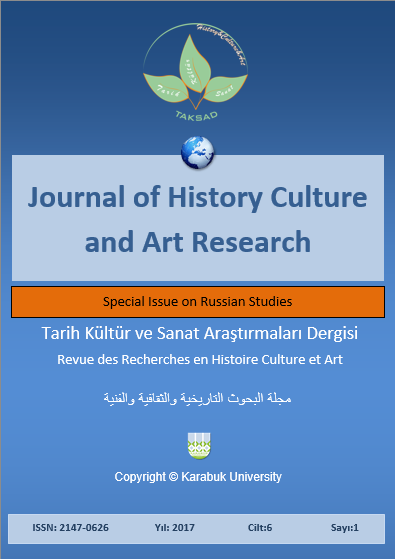Metaphors of Postmodernism in Neo-Victorian Fiction: “The Trial of Elizabeth Cree” by Peter Ackroyd and “The Decorator” by Boris Akunin
DOI:
https://doi.org/10.7596/taksad.v6i5.1260Keywords:
Neo-Victorianism, Postmodernism, Metaphor, Intertextuality, Thriller.Abstract
One of the features that characterizes postmodern fiction is an intense interest in the past, and especially so – in Victorian period, chiefly in its sensational aspects. Therefore we witness a revival of Victorian crime novel and this tendency can be traced not only in recent English literature, but in other literatures as well, Russian in particular. This gave birth to the term “neo-Victorian novel”, referring to the pieces, which recreate the atmosphere of the period, introduce a lot of intertextual allusions and references to the well-known Victorian novels and exploit most popular subjects of the 19th century literature. However as we will argue in this essay the authors often use these plots as implicit metaphors of postmodern art as such. It will be demonstrated on the example of two Neo-Victorian novels – “The Trial of Elizabeth Cree” by Peter Ackroyd (1995) and “The Decorator” by Boris Akunin; for the latter Ackroyd’s novel can be also regarded as one of the precedent texts. Both novels give their versions of the story of Jack the Ripper but what is more important in our case – employ akin plot structures, images and artistic devices, which in fact become metaphoric actualization of postmodern techniques.
References
Ackroyd, P. (1995). The Trial of Elizabeth Cree. Nan A. Talese. Doubleday.
Akunin, B. (2000). Декоратор. Особые поручения [Decorator. Special Assignments]. Moscow: Zakharov. [In Russian]
Bobileva, A. & Prokhorova, T. (2016). The interaction between the theatrical and fairytale discourses of Yuri Buida’s novel “Blue blood”. Journal of Language and Literature, ISSN 2078-0303, 7 (3), 206-210.
Breeva, T. (2010). "Викторианская Россия" в структуре национального мифа (на материале русского историософского романа конца ХХ века) [Victorian Russia within the structure of the national myth (on the material of Russian historiosophic novel of the end of the XXth century)]. Philology and Culture, 19. [In Russian]
Caroll, S. (2015). What is The Neo-Victorian Novel? URL: http://www.stephaniecarroll.net/2015/12/what-is-neo-victorian-novel.html, [accessed on 5 May, 2017].
Hadley, L. (2010). Neo-Victorian and Historical Narrative: The Victorians and Us. London: Palgrave Macmillan.
Ho, E. (2012). Neo-Victorianism and the Memory of Empire. Continuum International Publishing Group.
Kochergina, A. & Kozyreva, M. (2015). Space-time Organization of I. McEwan's Novel “Black Dogs”. Journal of Language and Linguistics, 6(3), 181-184.
Mezhhuyev, B. (2017). Русское викторианство между политикой и литературой (Жизнь и смерть Александра Солженицына) [Russian Victorianism between politics and literature (Life and death of Alexander Solzhenitsyn)]. URL: http://gefter.ru/archive/8744, [Accessed on 2 May, 2017]. [in Russian]
Rose, J. (2013). So what is neo-Victorianism? A Working Definition. Pastbooks. URL: https://pastbooks.wordpress.com/2013/11/05/so-what-is-neo-victorianism, [Accessed on 5 May, 2017].
Sibgatullina, V. & Krylov, V. (2016). Poetics of travelogues in Russian literature of the end of 19 - Beginning of 20 century in aspect of dialog of cultures. Journal of Language and Literature, 7 (3), 244-247.
Downloads
Published
How to Cite
Issue
Section
License
All papers licensed under Creative Commons 4.0 CC-BY.- Share — copy and redistribute the material in any medium or format
- Adapt — remix, transform, and build upon the material for any purpose, even commercially.
Under the following terms:
Attribution — You must give appropriate credit, provide a link to the license, and indicate if changes were made. You may do so in any reasonable manner, but not in any way that suggests the licensor endorses you or your use.
- No additional restrictions — You may not apply legal terms or technological measures that legally restrict others from doing anything the license permits.







